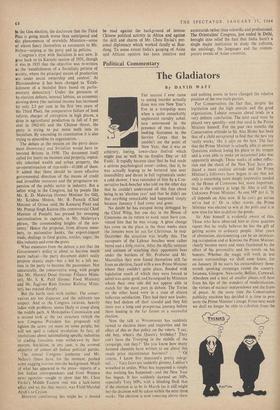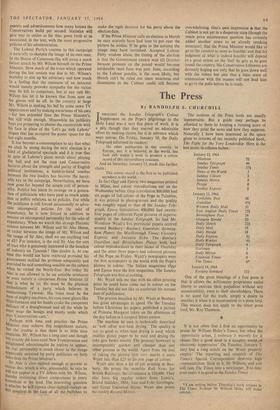Political Commentary
The Gladiators
By DAVID WATT THE nearest I ever came to seeing murder actually done was one New Year's Eve in a troopship mess when a quite remarkably unpleasant cavalry subal- tern announced in the presence of two brutish- looking Scotsmen in the Service Corps that be couldn't see the point of New Year, that it was an arbitrary, boring, lower-class festival which might just as well be on Empire Day or All Fools'. It rapidly became clear that he had made a serious psychological error—unless, that is, he was actually hoping to be battered into near insensibility and thrust in full regimentals under a cold shower. I was reminded of him by a Con- servative back-bencher who told me the other day that he couldn't understand all this fuss about being in an `election year' and that he didn't see that anything remarkable had happened simply because January 1 had come and gone.
No doubt he has escaped being debagged by . the Chief Whip, but one day in the House of Commons on its return to work must have con- vinced him that he was wrong. A great change has come on the place in the three weeks since the inmates were let out for Christmas. In mid- December the situation was briefly this. The occupants of the Labour benches were rather bored and a little restive. After the idyllic summer and autumn of watching their opponents bent under the burdens of Mr. Profumo and Mr. Macmillan they now found themselves still far from an eledtion, faced with a new Prime Minister whom they couldn't quite place, flooded with legislation much of which they were forced to admit was quite good, and harangued by Ministers whom their own side did not appear able to thatch for the most part in debate. The Tories on the other hand were in a state of almost ludicrous satisfaction. They had their new leader, they had shaken off their scandal and they felt there was a long and prosperous journey before them leading in the far future to a successful election.
Now the talk at Westminster has suddenly turned to election dates and majorities and the effect of this or that policy on the voters. 'I say, old boy, when's the Queen's birthday? They can't have the Trooping in the middle of the campaign, can they?' Do you know how many damned chemists have written to me about this resale price maintenance business? . . 'Of course, I know five thousand's pretty margi- nal....' Tory faces are suddenly gloomy, Labour's wreathed in smiles. What has happened is simply that nothing has happened—and the New Year has begun. It has suddenly dawned on ,MPs, especially Tory MPs, with a blinding flash that if the election is to be in March (as it still might be) the decision will be taken within the next three weeks. The election is now towering above them and nothing seems to have changed the relative position of the two main parties.
For Conservatives the fact that, despite the legislation and the high morale and the good organisation, Labour remains ahead tends to a very definite conclusion. The next card must be played very speedily—and that card is the Prime Minister himself. For the past two months the Conservative attitude to Sir Alec Home has been that of a child enraptured to find that the new toy 'really works,' like it says on the box. The fact that the Prime Minister is actually able to answer Questions without losing his place or his temper and is even able to make an occasional joke was apparently enough. Three weeks of sober reflec- tion and the shock of the New Year have pro- duced a more realistic attitude and the Prime Minister's followers have begun to see that not only is something more deeply impressive needed in the House of Commons but, more important, that to the country at large Sir Alec is still the Unknown Prime Minister. As one MP put it, 'It all depends on Alec now. If he can't get across we've had it.' Or in other words, the Prime Minister was elected to win at the polls and it is now time for him to deliver the goods. _ Sir Alec himself is evidently aware' of this. Those who have observed him at close quarters report that he really believes he has the gift of getting across to ordinary people. After years of abstention, electioneering can be an intoxicat- ing occupation and at Kinross the Prime Minister clearly become more and more fascinated by the effect of his personality and his words on his hearers. Whether the magic will work in less secure surroundings we shall soon know, for on January 20 he starts his extraordinary three- month speaking campaign round the country. Swansea, Glasgow, Newcastle, Belfast, Cornwall, Aberdeen, and a host of smaller places will hear from his lips of the wonders of modernisation, the virtues of nuclear independence and the fruits of peace. At the same time the Conservative publicity machine has decided it is time to pro- mote the Prime Minister's image. From next week we shall no longer be able to calculate from the posters and advertisements how many houses the Conservatives build per second. Statistics will
give way to smiles as Sir Alec peers forth at us associated, in the text, with the most progressive policies of his administration.
The Labour Party's counter to this campaign is naturally to sharpen the image of its own man.
In the House of Commons this will mean a much fiercer attack by Mr. Wilson himself on the Prime Minister. How much of the truce which operated during the last session was due to Mr. Wilson's inability to size up his adversary and how much to a feeling that the massacre of an innocent would merely provoke sympathy for the victim may be left to conjecture, but at any rate Mr. Wilson has let it be known that from now on the gloves will be off. In the country at large Mr. Wilson is making his bid by some more TV appearances and by making excursions of his own —far less extended than the Prime Minister's, but still wide enough. Meanwhile his publicity boys are preparing to plaster the countryside with his face in place of the 'Let's go with Labour' slogan that has occupied the poster space for the last eight months.
It has become a commonplace to say that what we shall be seeing during the next election is a kind of gladiatorial spectacle and it is true that in spite of Labour's pious words about playing the ball and not the man and Conservative lectures about the strength and purity of English political institutions, a hand-to-hand combat between the two leaders has become the inevit- able key to the campaign. Nevertheless, we have now gone far beyond the simple cult of person- ality. Politics has taken its revenge on a genera- tion of politicians who have paid as much atten- tion to public relations as to policies. For while the politician is still forced occasionally to advo- cate uncongenial policies for the sake of expediency, he is now forced in addition to assume an uncongenial personality for the sake of expediency. When we watch this strange Platonic contest between Mr. Wilson and Sir Alec Home, or rather between the image of Mr. Wilson and the image of Sir Alec, shall we see anything real at all? For instance, is the real Sir Alec the sort of man who is genuinely interested in the location of industry on Tyneside? One doubts it. At one time this would not have mattered provided his government tackled the problem adequately and provided he said something sensible on the subject When he visited the North-East. But today Sir Alec is not allowed to be an amiable aristocrat or even merely a competent Prime Minister (if that is what he is). He must be the physical embodiment of a party which believes in Modernising Tyneside. His voice must be the hum of mighty machines, his eyes must gleam like blast-furnaces and his hands evoke the competent delicacy of a draughtsman and all the while he Must wear the benign and manly smile which says 'Conservatives care.'
Perhaps with time and practice the Prime Minister may achieve this magnificent stature, but the trouble is that there is so little time available. Mr. Wilson has a long start and though not exactly the keen-eyed New Frontiersman and enlightened educationalist he aspires to appear, his real personality is much closer to the image apparently required by party publicists on both sides than the Prime Minister's.
Sir Alec is clear-sighted enough at present to realise this, which is why, presumably, he says he Will not appear in a TV debate with Mr. Wilson, thereby instituting direct comparisons in every household in the land. The interesting question is whether he will remain clear-sighted enough on this question in the face of all the ballyhoo to
make the right decision for his party about the election date.
If the Prime Minister calls an election in March he may scarcely have had time to put oyer the picture he wishes. If he goes to the autumn the image may have tarnished. Accepted Labour Party wisdom about the timing of the election is that the Government cannot wait till October because pressure on the pound would become intolerable once June was past. June, according to the Labour pundits, is the most likely, but March can't be ruled out since weariness and dissensions in the Cabinet could still become
overwhelming. One's own impression is that the Cabinet is not yet in a desperate state (though the resale price maintenance question has certainly added another stress to an already creaking structure); that the Prime Minister would like to go to the country as soon as feasible; and that his judgment of what is indeed feasible will depend to a great extent on the 'feel' he gets as he goes round the country. His Conservative followers are devoutly hoping not only that he goes down well with the voters but also that a false sense of communion with the masses will not lead him to go to the polls before he is ready.



































 Previous page
Previous page